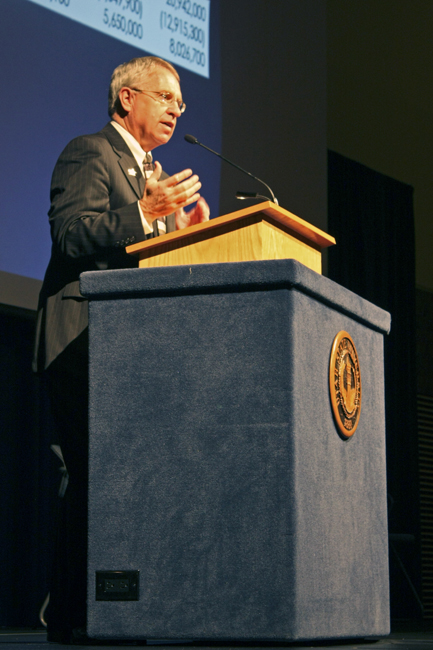Good news for some out-of-state students
In a meeting with USU employee associations Monday, USU President Stan Albrecht said he will implement the legacy provision of House Bill 364, allowing non-resident students to pay in-state tuition if one of their parents is a USU alumni.
The legacy provision will allow USU to compete with other Utah schools which subsidize tuition for out-of-state students, such as BYU, Albrecht said. For a non-resident student, the provision would reduce the cost of attendance more than $4,000 per semester, according to the published tuition rates on USU’s Admissions Web site. Currently, out-of-state undergraduate students pay roughly $6,442 per semester, versus the $2,263 in-state students pay.
Shaelee Barker, sophomore majoring in public relations, was glad to hear Albrecht had confirmed the legacy provision. Her family lives in Colorado, but because her father went to USU, she can now leave Utah this summer and still qualify for resident tuition next year.
“I’m super excited because I get to go home,” she said. “I have a lot of opportunities in Denver that I can’t get here.”
Albrecht’s office said the legacy provision will be administered by USU Admissions.
In addition to the legacy provision, House Bill 364 increases the number of border waivers for students attending Utah colleges from 400 to 600, said Michael Kennedy, Albrecht’s special assistant for state and federal relations. The border waiver allows students who live within 100 miles of Utah to apply for in-state tuition at state funded universities. The 600 border waivers will be distributed across Utah’s various universities by the Board of Regents, Kennedy said.
During the meeting, Albrecht addressed the campus-wide budget cuts with both the professional and the classified employee associations. Albrecht laid out the USU budget cuts from September 2008 all the way through fiscal year 2011, clarifying and taking questions from USU employees affected by the changes.
Albrecht spoke about a planned 8 percent budget cut looming for fiscal year 2011. He speculated if the economy doesn’t bottom out before then, USU will need to cut another $13 million beginning July 1, 2010.
“The big number for us is the one that’s hanging out there in 2010,” he said.
University Advancement Vice President Ross Peterson spoke shortly about USU’s endowment. He said the goal of $200 million had been reached so readily that his office had revised their goal to $400 million by 2012. He said many private donors have come forward in recent months to offer support in hard times. The endowment is now 58 percent of the way to its new goal, he said.
During the meeting Provost Raymond Coward answered questions about employee health insurance. Coward said last year’s health claims exceeded premiums by 15 percent. He said the USU employee health plans would remain largely the same, though there will be a $1 increase for employees enrolled in the “blue” plan.
Coward explained that Utah’s legislature funds 30 percent of the USU budget, and state money covers USU’s human resource salaries. As USU trims more from its budget in 2010, USU employees can expect to see more layoffs, Coward said.
“There are no alternatives,” he said, invoking the projected more than 27 percent cut in USU’s budget through fiscal year 2011 if the economic slump continues.
USU Vice President for Business & Finance Fred Hunsaker struck a positive note during the meeting. He said money will come back to USU in the future, and will be appropriated in different areas which can justify their existence with results.
Hunsaker said employee compensation will be funded in the coming budget.
“Salaries and health benefits for employees will remain a priority,” he said.
Coward responded to questions about which critical university programs will be protected for fiscal year 2010. He said each college within the university is being asked to trim 5 percent from their individual programs. After review by a mixed committee and president Albrecht, the final budget cuts for fiscal year 2010 will be available for the public to view on June 1, Coward said.
“The premise is to minimize direct financial impact on students,” Coward said.
–butler.brendon@gmail.com

